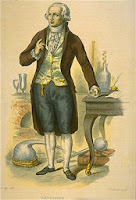 |
| Lavoisier |
An example will illustrate the difference between these two concepts:
- Antoine-Laurent de Lavoisier is
considered the father of modern chemistry. His Traité Élémentaire de Chimie
revolutionized many of the ideas that until then had dominated this
science. However, when it comes to the chemical reactions it describes, this
book is a mere catalogue. So we are told something like this:
If we mix oxygen gas and hydrogen gas and apply fire or an
electric spark to the mixture, an explosion occurs and the result is water.
This is a description. It tells what happens but offers no explanation of the phenomenon.
